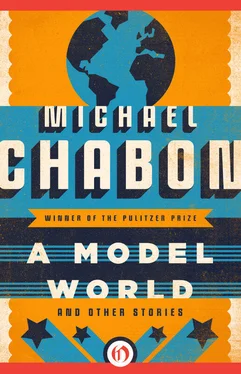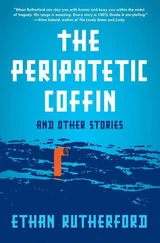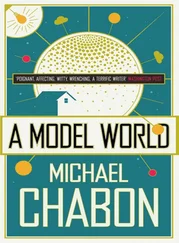Michael Chabon - A Model World And Other Stories
Здесь есть возможность читать онлайн «Michael Chabon - A Model World And Other Stories» — ознакомительный отрывок электронной книги совершенно бесплатно, а после прочтения отрывка купить полную версию. В некоторых случаях можно слушать аудио, скачать через торрент в формате fb2 и присутствует краткое содержание. Год выпуска: 2011, Издательство: Open Road Media, Жанр: Современная проза, на английском языке. Описание произведения, (предисловие) а так же отзывы посетителей доступны на портале библиотеки ЛибКат.
- Название:A Model World And Other Stories
- Автор:
- Издательство:Open Road Media
- Жанр:
- Год:2011
- ISBN:нет данных
- Рейтинг книги:5 / 5. Голосов: 1
-
Избранное:Добавить в избранное
- Отзывы:
-
Ваша оценка:
- 100
- 1
- 2
- 3
- 4
- 5
A Model World And Other Stories: краткое содержание, описание и аннотация
Предлагаем к чтению аннотацию, описание, краткое содержание или предисловие (зависит от того, что написал сам автор книги «A Model World And Other Stories»). Если вы не нашли необходимую информацию о книге — напишите в комментариях, мы постараемся отыскать её.
A Model World And Other Stories — читать онлайн ознакомительный отрывок
Ниже представлен текст книги, разбитый по страницам. Система сохранения места последней прочитанной страницы, позволяет с удобством читать онлайн бесплатно книгу «A Model World And Other Stories», без необходимости каждый раз заново искать на чём Вы остановились. Поставьте закладку, и сможете в любой момент перейти на страницу, на которой закончили чтение.
Интервал:
Закладка:
When I stopped by Harry’s the other night, the two Tomokos were out for the evening with a visitor from Nagoya, and after Harry had shown me their neat beds, their pastel closets, the photos on their walls, and samples of their handwriting, and had generally filled me in on them and on his own xenophilia, we sat down in the living room, on opposite sides of a six-pack of Rolling Rock, and looked at each other. I am not seeing anyone at present and had few accounts to amuse him with in this regard.
“So it sounds like you’ve been very busy,” I said.
“Really busy,” he said. “How about you?”
“Busy.”
There ensued an awkward pause, during which I might easily have drained my beer, slapped my knee, and slipped off into the October evening — the sun had gone down distressingly early. I could not think of anything to say, not a single thing, and I saw how much I had come to depend on the presence of a third person at our meetings — on having someone there to fill up the awful gap in our facetious conversation. I looked again at Harry’s beard, which had of late grown to mermanish proportions, floating out from his face. Then I looked all around me. “It’s nice and warm in here,” I said at last.
Oh, my God,” he said, shivering in recollection. “I can’t believe we lived that way. Do you remember that one morning there was a, like, a skin of ice on the water in the toilet?”
“Oh, God, I remember,” I said.
“Ha.”
“Hmm.”
“Have you heard anything from Kim?” he said, standing, making for the refrigerator to cover the question. I said that I had not, nor had I any news of little Raymond James. I understood from Kim’s mother, whom I’d met in the Giant Eagle a couple of months before, that Kim was working out of Honolulu as a personal secretary on board a rich woman’s yacht, but someone else had told me she was working as a paralegal in Philadelphia. Harry said he had heard these reports already and disbelieved them both. He handed me another can of beer.
“Funny how that all ended up, huh?” he said.
“Funny.”
“I pretty much bailed on her, I guess. On the baby, too.”
We sipped our beers and wondered at one another, at what was left of all that and of those prodigal days.
“Not too funny, really,” Harry said.
“Kind of not too funny at all,” I said.
The telephone rang, and Harry went into the kitchen to answer it. He spoke in curt and secretive tones to some friend I would never meet, promising — ah, but this came as a blow to me — that he would be free to call him or her back in a little while. He returned with a mostly empty bottle of George Dickel and a long face.
“Maybe I’d better go, Harry,” I said.
Oh, no!” he said, looking so earnest that my doubts were almost erased. “I have things to show you.”
He took me down into the basement of the house, where there were a washer and dryer, three bicycles, a stranded toilet lying on its side, some camping gear — including two voided backpacks bearing Rising Suns and some of those horrific Hello Kitty patches — and a vast assortment of cardboard cartons, perhaps sixty or seventy in all, stacked in ragged stacks and labeled in Harry’s familiar, Mayan-looking handwriting: PIPE TAMPERS, VELVETEEN, HEMP, SQUARE BUTTONS, GUM ARABIC, MR. POTATO HEAD HATS, ATOMIZER BULBS, PLASTIC SUSHI REPLICAS, FAN BELTS, LITTLE RED MONKEYS. He showed me the plans for a new game called Car Crash, involving bottle caps, miniature Christmas light bulbs, tin-whistle sirens, and cans of some knockoff red Play-Doh from Malaysia, and then, crouching down on the floor and reaching in behind the carton of gum arabic, drew out a large square box.
“This is going to be my next toy,” he said. “I’m calling it Treasure.”
This time the word TREASURE was machine-stenciled on the box’s sides, in large letters, along with the name of a leading British toy manufacturer and the two words “Spanish Main,” in Old English type.
“They tried to market it over here, but it stiffed early,” he explained, opening the seal on the box with his thumbnail. “Levinsky made a killing in Baltimore on a misdelivered shipment of game pieces.”
I watched his face for any sign that he was toying with me, but there was none; he seemed to want only to show me, with a hint of desperation, what was inside the crate, as though the hardest part of it for him had been having no one in whom to confide the secrets of his fabulous vault. He lifted the flaps to reveal a king’s ransom, a cool million, in cardboard doubloons, painted gold and dimly glittering in the basement light, and I wondered if this was what had been in the box I’d buried in Mrs. Colodny’s yard, or if it had been some other treasure entirely. I knew little about the subject, but I hoped that once you had buried a treasure you did not have to keep reburying it again and again.
“It’s supposedly real gold dust in the paint,” Harry said. “That was the gimmick, I guess.”
He handed me a thick coin, and I examined it. It bore an illegible mock inscription and a crude cartoon of an emperor’s head, and as I fingered it some of its luster came away on my hands. Harry was looking right at me now with a fevered smile, and once more I didn’t know what to say, but there was no one else there, and I had to say something.
“We’re rich,” I said.
Part II: The Lost World
The Little Knife
ONE SATURDAY IN THAT last, interminable summer before his parents separated and the Washington Senators baseball team was expunged forever from the face of the earth, the Shapiros went to Nags Head, North Carolina, where Nathan, without planning to, perpetrated a great hoax. They drove down I-95, through the Commonwealth of Virginia, to a place called the Sandpiper — a ragged, charming oval of motel cottages painted white and green as the Atlantic, and managed by a kind, astonishingly fat old man named Colonel Larue, who smoked cherry cigars and would, if asked, play catch or keep-away. Outside his office, in the weedy gravel, stood an old red-and-radium-white Coke machine, which dispensed bottles from a vertical glass door that sighed when you opened it, and which reminded Nathan of the Automat his grandmother had taken him to once in New York City. The sight of the faded machine and of the whole Sandpiper — like that of the Automat — filled Nathan with a happy sadness, or, really, a sad happiness; he was not too young, at ten, to have developed a sense of nostalgia.
There were children in every cottage — with all manner of floats, pails, paddles, trucks, and flying objects — and his younger brother Ricky, to Nathan’s envy, immediately fell in with a gang of piratical little boys with water pistols, who were always reproducing fart sounds and giggling chaotically when their mothers employed certain ordinary words such as “hot dog” and “rubber.” The Shapiros went to the ocean every summer, and at the beginning of this trip, as on all those that had preceded it, Nathan and his brother got along better than they usually did, their mother broke out almost immediately in a feathery red heat rash, and their father lay pale and motionless in the sun, like a monument, and always forgot to take off his wristwatch when he went into the sea. Nathan had brought a stack of James Bond books and his colored pencils; there were board games — he and his father were in the middle of their Strat-O-Matic baseball playoffs — and miniature boxes of cereal; the family ate out every single night. But when they were halfway through the slow, dazzling week — which was as far as they were to get — Nathan began to experience an unfamiliar longing: He wanted to go home.
Читать дальшеИнтервал:
Закладка:
Похожие книги на «A Model World And Other Stories»
Представляем Вашему вниманию похожие книги на «A Model World And Other Stories» списком для выбора. Мы отобрали схожую по названию и смыслу литературу в надежде предоставить читателям больше вариантов отыскать новые, интересные, ещё непрочитанные произведения.
Обсуждение, отзывы о книге «A Model World And Other Stories» и просто собственные мнения читателей. Оставьте ваши комментарии, напишите, что Вы думаете о произведении, его смысле или главных героях. Укажите что конкретно понравилось, а что нет, и почему Вы так считаете.












